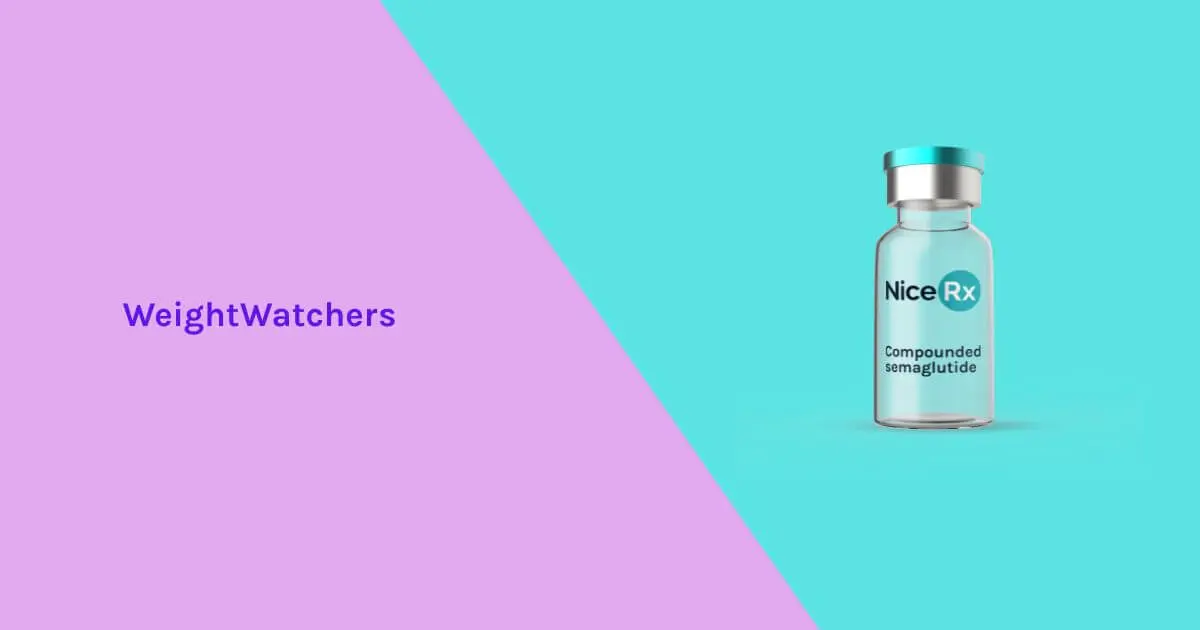Weight Watchers stopped supplying semaglutide: Find out where you can get it
What happens when one of the biggest names in weight loss backs away from one of the most sought-after treatments? WeightWatchers' recent decision to halt supplies of compounded semaglutide surprised many, signaling a critical shift in the evolving—and often confusing—world of GLP-1 medications.
Key highlights
- Weight Watchers was a renowned telehealth provider that was offering compounded semaglutide prescriptions through Sequence.
- In May 2025, WWs issued a statement declaring that they would not be offering compounded semaglutide anymore.
- Currently, Weight Watchers offers only FDA-approved medications such as Ozempic ®, Trulicity ®, Victoza ®, Wegovy®, Zepbound™, Mounjaro ®, Saxenda®, and Metformin. They no longer offer compounded semaglutide.
- Sequence clinicians are focused on helping patients with insurance coverage challenges, such as prior authorization, appeal letters, and obtaining access to savings cards for GLP-1 medications.
- If you plan to continue or start your treatment with compounded semaglutide due to certain medical indications, contact other telehealth providers that are offering compounded semaglutide prescriptions. The medication is legal under section 503a when personalization is needed for a patient.
Semaglutide is a GLP-1 medication (GLP-1 agonist) that has three brand names: Ozempic®, Rybelsus®, and Wegovy®. Ozempic and Rybelsus are indicated for managing blood sugar levels in patients with type 2 diabetes, while Wegovy is FDA-approved for managing body weight in obese and overweight individuals, when used along with healthy habits such as exercise and a balanced diet. Ozempic is also used off-label for weight management. In the last few years, these medications have become highly popular weight loss medications, which led to a national shortage of Ozempic and Wegovy in 2022.
During these shortages, compounding pharmacies started selling compounded semaglutide to fill the gap. Compounded semaglutide became a more accessible option for patients. The FDA allowed compounding pharmacies to manufacture and sell compounded semaglutide, which should essentially be a copy of Ozempic and Wegovy. At that time, compounded semaglutide became widely available via online pharmacies and telehealth facilities. Weight Watchers was one of the well-known telehealth providers that offered compounded semaglutide and compounded tirzepatide prescriptions. However, Weight Watchers recently announced it has stopped offering compounded semaglutide prescriptions.
This article outlines why Weight Watchers has stopped offering compounded semaglutide prescriptions, explains why it was previously offering prescriptions for compounded semaglutide, what it is offering as an alternative, and provides information on how to obtain compounded semaglutide now. Keep reading to learn.
Why WeightWatchers offered compounded semaglutide
Over the last few years, the demand for Wegovy and Ozempic has increased dramatically as these medications have become popular for weight loss. Due to overwhelming demand, the manufacturer of Ozempic and Wegovy, Novo Nordisk, couldn’t meet the supply needs, and these medications were added to the U.S. FDA’s drug shortage list in 2022.
To meet the needs of semaglutide patients, the FDA allowed compounding pharmacies to manufacture and distribute compounded semaglutide that should be a copy of the branded semaglutide under sections 503A and 503B.
During these shortages, Weight Watchers started offering compounded semaglutide prescriptions through its telehealth arm, Sequence, available through telehealth consultations and online prescriptions. First, patients used to sign up through Sequence and get thoroughly assessed by clinicians. Sequence clinicians used to check their eligibility for using GLP-1 medications such as semaglutide after assessing their body mass index, blood sugar levels, medical history, and comorbid conditions.
Afterwards, they would send patients’ prescriptions to partnered compounding pharmacies such as Olympia. Olympia is a 503B compounding facility that ensured patients could still access GLP-1 medications during the shortage of the branded medications.
Compounded semaglutide is a customized version of semaglutide that is manufactured by a licensed pharmacist or a healthcare provider in compounding pharmacies (503A) or FDA-registered outsource facilities (503B) to meet the medical needs of patients. Unlike branded medications, the medication is available in various customized dosages and formulations. Compounded medications are not approved by the FDA, but they are easily accessible during drug shortages.
Additionally, compounded semaglutide is suitable for those patients who cannot access branded semaglutide. Ozempic and Wegovy cost $1,000 to $1,300 per month without insurance. In comparison, compounded semaglutide costs $200 to $300 per month.
What happened to the Weight Watchers compounded semaglutide program?
In May 2025, Weight Watchers stopped offering compounded semaglutide prescriptions.
The FDA’s updated guidance
The FDA issued a warning that compounded semaglutide may not be the same as Wegovy and Ozempic. Compounded medications may contain too little, too much, or no active substance at all. Additionally, these products may be counterfeit and harmful to humans as they may contain harmful or incorrect ingredients.
By July 31, 2025, the FDA received 605 reports of adverse events that occurred after patients used compounded semaglutide.
The FDA mentions that some compounding pharmacies producing compounded semaglutide are using salt forms of semaglutide (semaglutide acetate and semaglutide sodium) instead of the base form of semaglutide used in branded semaglutide. Products labeled as “for research purposes only” contain unknown ingredients and are not safe for human consumption.
In May 2025, WW announced that it would stop offering compounded semaglutide prescriptions for new members after May 21, 2025, to comply with the FDA’s guidelines.
How does this decision impact patients?
The sudden stoppage of the compounded semaglutide program by Weight Watchers has been distressful for patients who wanted to start or maintain their weight loss journey with compounded semaglutide. However, many other telehealth providers continue to sell compounded alternatives when personalized dosing or formulations are needed for the patient.
Focusing on FDA-approved medications
In May 2025, Weight Watchers confirmed that it would not be offering compounded semaglutide prescriptions. The company has started focusing more on providing access to brand-name and FDA-approved weight loss medications such as Wegovy and Zepbound through its WW Clinic.
Weight Watchers has started a new collaboration with Novo Nordisk to increase access to authentic and brand-name semaglutide (Wegovy®). Weight Watchers clinic members could get Wegovy at a discounted price of $299 until July 31, 2025.
Official WeightWatchers statement
Weight Watchers has announced on their official website that the FDA has removed semaglutide from the shortage list and prohibited compounding pharmacies from selling compounded semaglutide. To comply with the FDA’s recommendations, WW has decided to discontinue offering compounded semaglutide prescriptions. They have stated that their clinicians will help patients switch to FDA-approved medications safely.
New members won’t be able to get prescriptions for compounded weight loss drugs, such as semaglutide, from WW clinicians through its clinic membership. The company has already terminated subscriptions of existing members for compounded GLP-1 medications who do not plan to use the brand-name medications. The company also sent text messages containing a link to cancel their subscription to the compounded semaglutide program to all users.
If you did not receive a cancellation link or your subscription did not get cancelled automatically, you can contact Weight Watchers’ customer service for assistance. Additionally, you can also revert to their standard membership.
What does this mean for patients?
Impact on current patients
Sudden discontinuation of compounded semaglutide prescriptions by WW is distressful for patients who were using compounded semaglutide for weight management.
Without insurance, Wegovy costs approximately $ 1,000 to $1,300, compared to $129 to $189 for compounded semaglutide offered by WW membership plans.
Insurance coverage of brand-name medications like Ozempic and Wegovy typically requires prior authorization by insurance providers if the patient meets eligibility criteria. This might also be challenging for the patients.
Additionally, sudden discontinuation of the medication may also result in weight regain in many patients, which may also be frustrating for them.
Weight Watchers has announced that their clinicians will ensure that all patients transition to FDA-approved medications smoothly. Although this change has been stressful and inconvenient for many patients, there is still an option to switch to Wegovy.
Impact on new patients seeking treatment
For new patients, Sequence only prescribes FDA-approved medications. These include FDA-approved GLP-1 medications such as Ozempic ®, Trulicity ®, Victoza ®, Wegovy®, Zepbound™, Mounjaro ®, Saxenda® and non-GLP-1 medications like Metformin.
Their clinicians help patients navigate through challenges associated with insurance coverage and prior authorization. Patients can use manufacturer savings cards such as the Wegovy Savings Card and the Ozempic Savings Card to help save on these medications.
Impact on cost and accessibility
Compounded semaglutide is cheaper than branded medications. Typically, compounded semaglutide costs $150-200 for a monthly supply. In comparison, Ozempic and Wegovy cost around $1,000 to $1,300 or more per month, which is unaffordable without insurance for many patients. Although compounded medications are cheaper, they are not covered by insurance, but patients can still afford them due to their low cost.
Insurance coverage for brand-name medications like Ozempic and Wegovy is challenging for many patients as it requires a valid prescription for the FDA-approved indication of the medication, prior authorization, and extensive criteria to fulfill. Additionally, some insurance companies do not cover weight loss medications such as Wegovy as they consider them a lifestyle medication rather than a medical necessity.
Weight Watchers’ insurance specialists help patients with prior authorization, appeals, and paperwork to get insurance coverage for the FDA-approved medications. Their clinicians also guide patients about manufacturer savings cards. Eligible patients can get a monthly supply of semaglutide for as low as $25 with these cards.
Navigating alternatives
WeightWatchers is offering prescriptions for the following medications as an alternative to compounded semaglutide:
- Ozempic®
- Trulicity®
- Victoza®
- Wegovy®
- Zepbound®
- Mounjaro®
- Saxenda®
- Metformin
- Bupropion/Naltrexone
If you are an existing Weight Watchers member who was using compounded semaglutide for weight loss, it is time to make a choice. If you plan to stick with compounded semaglutide, consider consulting a new telehealth provider that currently offers compounded semaglutide prescriptions with personalized treatment plans that are not commercially available.
If you plan to choose brand-name semaglutide, you can consult with Sequence clinicians to get the medication at discounted or promotional prices.
Understanding the regulations for compounded semaglutide
During shortages of Ozempic and Wegovy, the FDA temporarily permitted the compounding of semaglutide injections that were essentially identical to the FDA-approved semaglutide. Under Section 503A, state-licensed pharmacies and physicians were allowed to compound, dispense, and distribute semaglutide until April 22, 2025. Under Section 503B, registered outsourcing facilities were granted the same authority until May 22, 2025.
Now, the FDA has removed branded semaglutide from the shortage list, and it no longer allows compounding semaglutide. However, under section 503a, compounding pharmacies can still offer compounded semaglutide for patients with documented medical needs, such as allergies to certain ingredients of the medication or when a custom formulation is needed.
Pharmacies or physicians can legally compound semaglutide under Section 503A regulations only if they can meet the following conditions:
Prescription-based compounding
- It must be for a specific patient with documented medical needs that cannot be met by the commercially available product.
- The pharmacy or physician must have a valid prescription from a licensed prescriber.
- Pharmacies cannot make bulk batches for “general sale.”
Who can compound
- A licensed pharmacist in a state-licensed compounding pharmacy.
Quality of ingredients
The ingredients used must:
- Meet USP/NF standards (official quality benchmarks).
- Come from FDA-registered suppliers.
- Include a valid certificate of analysis (proving purity/quality)
Restrictions on what can be compounded
- Pharmacies cannot compound drugs that are on the FDA “unsafe or ineffective” list.
- Compounding pharmacies cannot make “regular or excessive” copies of drugs that are commercially available unless the prescriber determines the compounded version makes a meaningful difference for an individual patient.
- Pharmacies cannot compound drugs that the FDA has said are too difficult to compound safely.
How to get compounded semaglutide
You can get compounded semaglutide from telehealth providers who prescribe personalized dosing and formulations to meet individual medical needs. If medically appropriate, they will prescribe a personalized dosing schedule and treatment plan according to your medical needs.
Compounded semaglutide is suitable if you are allergic to any specific ingredient of branded semaglutide or the standard dosing or formulations are unsuitable for you.
If you experience intolerable side effects with standard doses, customized microdoses of compounded semaglutide may help achieve desired results with minimal side effects.
The NiceRx Weight Loss Program offers personalized compounded semaglutide prescribed by licensed healthcare providers and dispensed by licensed compounding pharmacies.
Frequently asked questions
When did Weight Watchers stop offering compounded semaglutide?
Weight Watchers stopped offering compounded semaglutide on May 21, 2025, after the FDA issued a warning letter to all compounding pharmacies stating that compounded semaglutide should not be dispensed and distributed unless medically necessary.
Why did Weight Watchers discontinue the program?
Weight Watchers discontinued compounded semaglutide due to the FDA’s warning to all compounding pharmacies to stop compounding semaglutide. The FDA issued this notice as soon as it removed Wegovy and Ozempic from the shortage list. Weight Watchers announced that they have decided to comply with the FDA’s rules and regulations. From May 2025, they started prescribing only FDA-approved medications.
Does WW still prescribe semaglutide at all?
Weight Watchers still prescribes semaglutide but only its brand-name medications, Ozempic and Wegovy. They have stopped offering compounded semaglutide.
Is compounded semaglutide banned?
No, compounded semaglutide is not completely banned. The medication can still be compounded for individual medical needs (under section 503a).
What if I was already on compounded semaglutide through WW?
You can cancel your Weight Watchers’ subscription for the compounded semaglutide program or revert to their standard membership program. If you are unable to cancel, you can contact their customer support for assistance. If you plan to continue treatment with compounded semaglutide, contact other telehealth providers that are still offering prescriptions for compounded medications. Additionally, if you plan to switch to brand-name semaglutide, you can inform your Sequence clinicians. They will guide you about insurance coverage, prior authorization, and savings card programs.
What’s the difference between compounded semaglutide and Wegovy?
Wegovy is a brand-name medication containing the active ingredient semaglutide, which is approved by the FDA for weight management. The medication is manufactured only by Novo Nordisk. In comparison, compounded semaglutide is a customized version of semaglutide that is not approved by the FDA. This medication is produced by compounding pharmacies to meet the medical needs of the patient. For example, if you are allergic to certain ingredients in semaglutide, compounding pharmacies can exclude those ingredients and produce an allergen-free compounded version of semaglutide.
What alternatives are available through Weight Watchers?
Weight Watchers is offering the following FDA-approved medications as an alternative to compounded medications:
- Ozempic®
- Trulicity®
- Victoza®
- Wegovy®
- Zepbound®
- Mounjaro®
- Saxenda®
- Metformin
- Bupropion/Naltrexone
Will my insurance provider cover GLP-1 medications?
Most insurance companies cover GLP-1 medications for type 2 diabetes management or for cardiovascular risk reduction. However, most insurance plans do not cover GLP-1 medications for weight loss as they consider obesity and overweight a cosmetic concern rather than a medical need. It is recommended to verify with your insurance provider whether they cover GLP-1 medications.
Bottom line
Previously, Weight Watchers was a renowned telehealth provider that was offering compounded semaglutide. Since May 2025, it has discontinued compounded semaglutide to align with the FDA’s rules and regulations.
Weight Watchers is currently offering FDA-approved medications such as Ozempic®, Trulicity®, Victoza®, Wegovy®, Zepbound™, Mounjaro®, Saxenda®, and Metformin instead of compounded semaglutide through the WW clinic. Their clinicians are focused on helping patients navigate the challenges of prior authorization and insurance coverage of GLP-1 medications.
If you still plan to continue your treatment with compounded semaglutide, you can contact other telehealth providers and programs to get personalized formulations of compounded semaglutide. Consult your healthcare provider to discuss the most appropriate treatment options for you and concerns related to your health condition.






